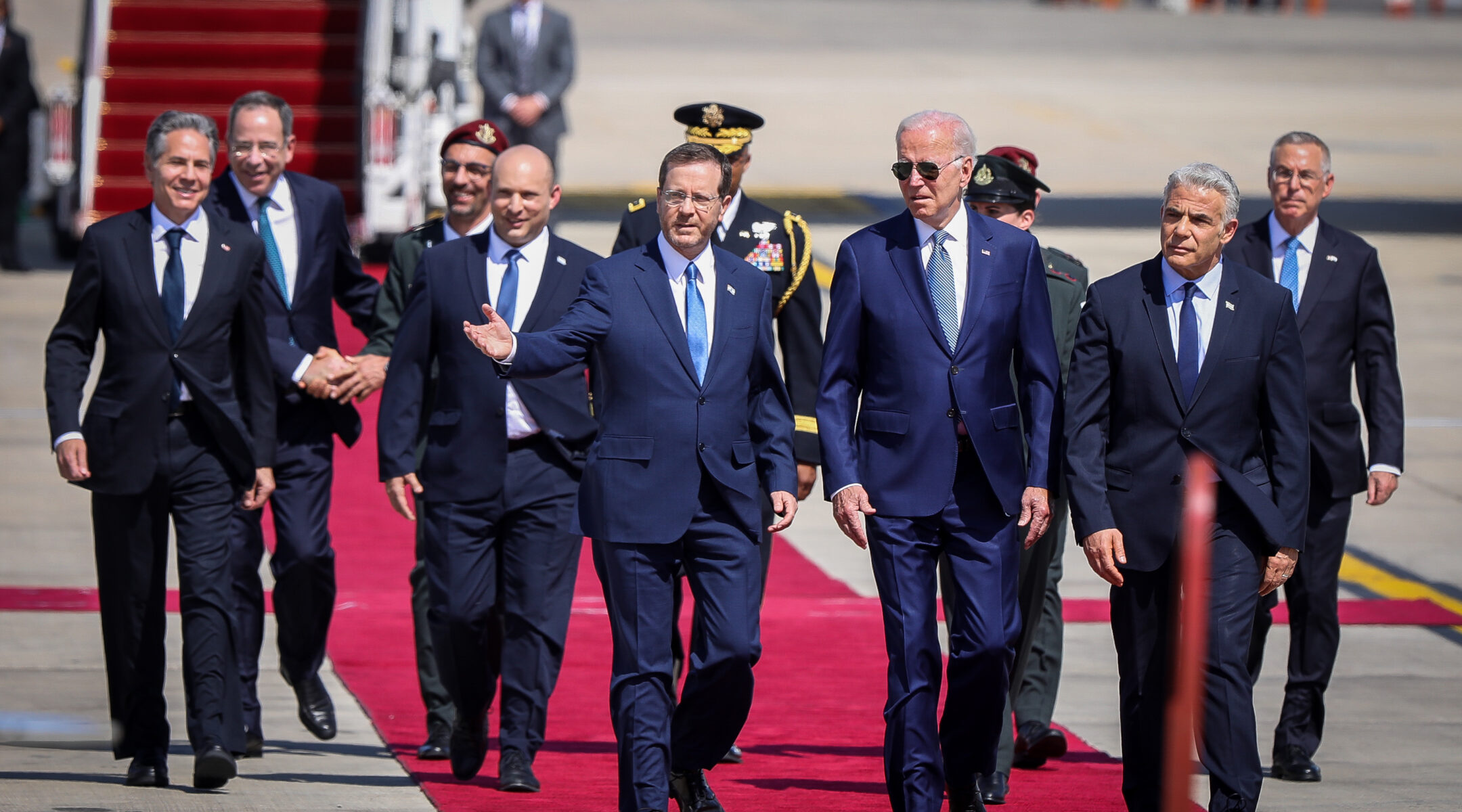TEL AVIV (JTA) — Joe Biden kicked off his 10th trip to Israel — and first as U.S. president — on Wednesday by declaring that the relationship between the two countries is “bone-deep.”
Biden told Israeli President Isaac Herzog “I am home,” according to Herzog’s office, and he attempted to prove it right away. Speaking at Ben Gurion Airport, Biden recounted his extensive personal history with Israel, including a 1973 meeting with then-prime minister Golda Meir that is a favorite — if sometimes embroidered — anecdote.
“Now as president, I’m proud to say that our relationship with the state of Israel is deeper and stronger in my view than it’s ever been,” Biden said. “And with this visit, we’re strengthening our connection even further.”
Prime Minister Yair Lapid and Alternate Prime Minister Naftali Bennett gave Biden a warm welcome on the tarmac, where a Y-shaped red carpet — one path for the president and his closest aides and the other for the rest of his delegation — had been laid. The dignitaries gave each other fist bumps instead of handshakes, in a nod to the ongoing pandemic.
“Welcome, our brother Joseph,” Israeli president Isaac Herzog said, alluding to the fact that Biden shares a name with a Jewish patriarch. “You have been a true friend and a staunch supporter of Israel and the Jewish people.”
The Israel Defense Forces band played three songs: the U.S. and Israeli anthems, followed by “B’Shanah Haba’a,” a popular and apolitical song by late Israeli poet Naomi Shemer that speaks of certainty about a better future.
Biden’s trip, which also includes a foray to Saudi Arabia, is aimed at ensuring a strong future not just for U.S.-Israeli relations but for the entire Middle East, amid shifting dynamics there. The trip comes at a low point in Israel-Palestinian relations and ongoing disagreements about how to handle Iranian aggression in the region. Biden and Israeli leaders are expected to discuss the formation of a joint Arab and Israeli alliance, which would include Saudi Arabia, to counter Iran.
On Thursday, Biden and Lapid plan to sign what they are calling a “Jerusalem Declaration,” that “commits both countries to using all elements of their national power against the Iranian nuclear threat,” a senior Israeli official told reporters earlier this week. It will also contain a commitment to extending U.S. support for Israeli defense spending.
There is daylight between the two countries on the exact tactics that should be deployed to manage that threat, particularly on whether the United States should reenter the Iran nuclear deal under which the country agreed to roll back its nuclear program in exchange for sanctions relief. Israel does not like the deal, while Biden wants to rejoin it.
Unlike Lapid and Herzog, Biden did not name Iran in his remarks. Instead, he outlined elements of his Israel itinerary: visits to see Israeli defense technology in action and to Yad Vashem, Israel’s Holocaust memorial, a staple of tours by foreign heads of state.
In addition to meeting with Lapid and Bennett, Biden is scheduled to spend 15 minutes with Benjamin Netayahu, the former prime minister who is a candidate again in November’s election. And he will meet with Palestinian officials in an effort to rebuild ties that were ruptured under his predecessor, Donald Trump.
“We’ll discuss my continued support, even though I know it’s not in the near term, [for] a two state solution, which remains in my view the best way to ensure the future of equal measure of freedom, prosperity and democracy for Israelis and Palestinians alike,” Biden said.
The trip, he said, was meant to lead to “greater peace. Greater stability. Greater connection.”
The delegation and its hosts have a “full agenda,” Biden said in his speech, “because the U.S.-Israeli relationship touches every issue that matters to our mutual futures. We are united in shared values. Or shared vision. I look forward to our time together over the next few days. May Israel and the United States continue to grow and prosper, and to the benefit of the entire world. I mean that: The entire world.”
Ron Kampeas contributed reporting.
JTA has documented Jewish history in real-time for over a century. Keep our journalism strong by joining us in supporting independent, award-winning reporting.






